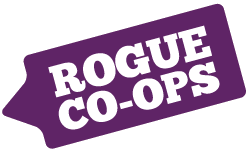Cooperative
A co-operative (also known as co-op, cooperative or coop) is an autonomous association of people united voluntarily to meet their common economic, social, and cultural needs and aspirations through a jointly owned and democratically controlled business.
Cooperatives include non-profit community organizations and businesses that are owned and managed by the people who use their services (a consumer cooperative); by the people who work there (a worker cooperative); by the people who live there (a housing cooperative); hybrids such as worker cooperatives that are also consumer cooperatives or credit unions; multi-stakeholder cooperatives such as those that bring together civil society and local actors to deliver community needs; and second and third tier cooperatives whose members are other cooperatives.
In short, a co-op can be defined as "a jointly owned enterprise engaging in the production or distribution of goods or the supplying of services, operated by its members for their mutual benefit, typically organized by consumers or farmers."[2] Co-operative businesses are typically more economically resilient than many other forms of enterprise, with twice the number of co-operatives (80%) surviving their first five years compared with other business ownership models (41%).[3] Co-operatives frequently have social goals which they aim to accomplish by investing a proportion of trading profits back into their communities. As an example of this, in 2013, retail co-operatives in the UK invested 6.9% of their pre-tax profits in the communities in which they trade as compared with 2.4% for other rival supermarkets.[4]
Consumers' cooperative
A consumers' cooperative is a business owned by its customers. Employees can also generally become members. Members vote on major decisions and elect the board of directors from among their own number. The first of these was set up in 1844 in the North-West of England by 28 weavers who wanted to sell food at a lower price than the local shops.
Retailers' cooperative
A retailers' cooperative (known as a secondary or marketing cooperative in some countries) is an organization which employs economies of scale on behalf of its members to receive discounts from manufacturers and to pool marketing. It is common for locally owned grocery stores, hardware stores and pharmacies. In this case the members of the cooperative are businesses rather than individuals.
Worker cooperative
A worker cooperative or producer cooperative is a cooperative, that is owned and democratically controlled by its "worker-owners". There are no outside owners in a "pure" workers' cooperative, only the workers own shares of the business, though hybrid forms exist in which consumers, community members or capitalist investors also own some shares. In practice, control by worker-owners may be exercised through individual, collective or majority ownership by the workforce, or the retention of individual, collective or majority voting rights (exercised on a one-member one-vote basis). A worker cooperative, therefore, has the characteristic that the majority of its workforce owns shares, and the majority of shares are owned by the workforce. Membership is not always compulsory for employees, but generally only employees can become members either directly (as shareholders) or indirectly through membership of a trust that owns the company.
